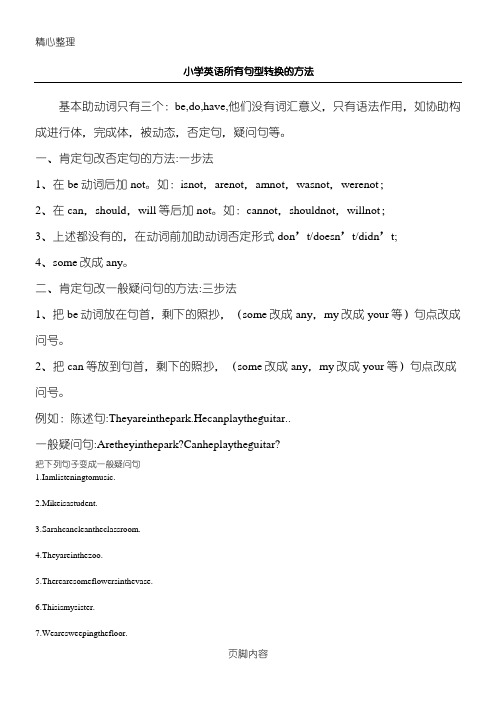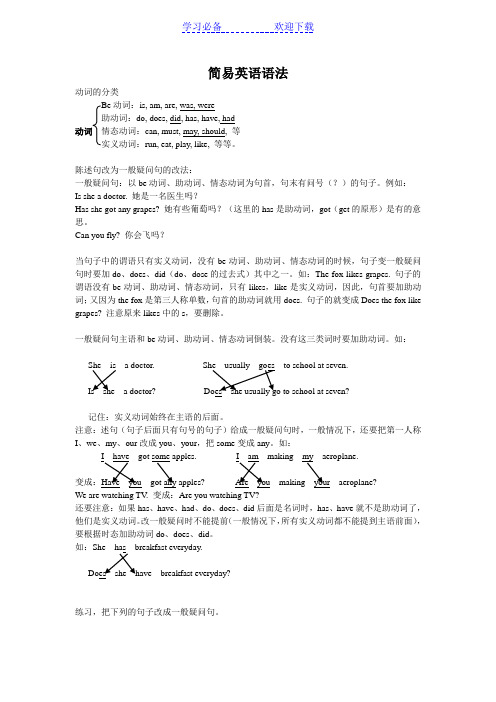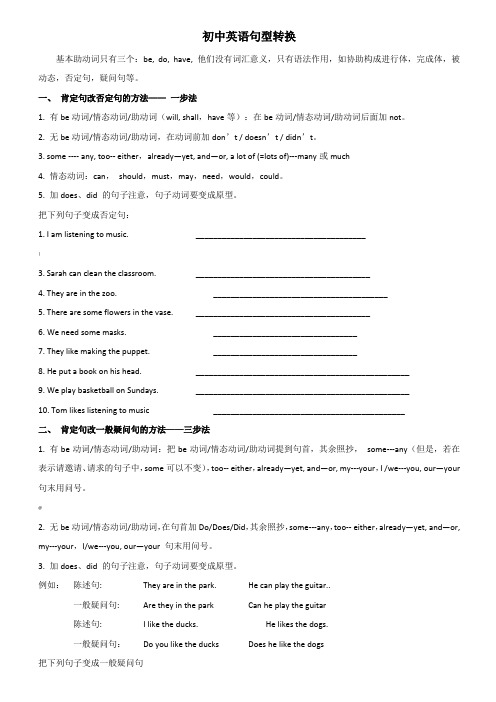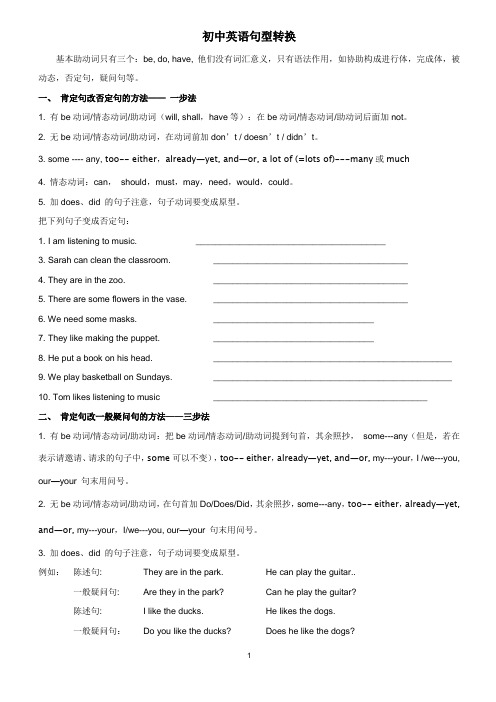陈述句变否定句一般疑问句特殊疑问句及练习
小学英语句型转换(陈述句变一般疑问句特殊疑问句及练习)

小学英语所有句型转换的方法基本助动词只有三个:be, do, have, 他们没有词汇意义,只有语法作用,如协助构成进行体,完成体,被动态,否定句,疑问句等。
一、肯定句改否定句的方法——一步法1、在be动词后加not。
如:is not ,are not ,am not,was not,were not;2、在can,should,will等后加not。
如:cannot,should not,will not;3、上述都没有的,在动词前加助动词否定形式don’t/doesn’t/didn’t。
4、some 改成any。
二、肯定句改一般疑问句的方法——三步法1、把be动词放在句首,剩下的照抄,(some 改成any,my改成your等)句点改成问号。
2、把can,shall,will等放到句首,剩下的照抄,(some 改成any,my改成your等)句点改成问号。
例如:陈述句: They are in the park. He can play the guitar..一般疑问句: Are they in the park? Can he play the guitar?把下列句子变成一般疑问句1. I am listening to music._______________________________________2. Mike is a student._______________________________________3. Sarah can clean the classroom.________________________________________4. They are in the zoo.________________________________________5. There are some flowers in the vase.________________________________________6.This is my sister._________________________________________7.We are sweeping the floor.__________________________________________3、上述都没有的,在句首请助动词Do/Does/Did帮忙,剩下的照抄,(some 改成any,my改成your等)句点改成问号。
【史上最强】重点小学英语句型转换(陈述句变一般疑问句特殊疑问句及练习测试)

小学英语所有句型转换的方法基本助动词只有三个:be,do,have,他们没有词汇意义,只有语法作用,如协助构成进行体,完成体,被动态,否定句,疑问句等。
一、肯定句改否定句的方法:一步法1、在be动词后加not。
如:isnot,arenot,amnot,wasnot,werenot;2、在can,should,will等后加not。
如:cannot,shouldnot,willnot;3、上述都没有的,在动词前加助动词否定形式don’t/doesn’t/didn’t;4、some改成any。
二、肯定句改一般疑问句的方法:三步法1、把be动词放在句首,剩下的照抄,(some改成any,my改成your等)句点改成问号。
2、把can等放到句首,剩下的照抄,(some改成any,my改成your等)句点改成问号。
例如:陈述句:Theyareinthepark.Hecanplaytheguitar..一般疑问句:Aretheyinthepark?Canheplaytheguitar?把下列句子变成一般疑问句1.Iamlisteningtomusic._______________________________________2.Mikeisastudent._______________________________________3.Sarahcancleantheclassroom.________________________________________4.Theyareinthezoo.________________________________________5.Therearesomeflowersinthevase.________________________________________6.Thisismysister._________________________________________7.Wearesweepingthefloor.__________________________________________3、上述都没有的,在句首请助动词Do/Does/Did帮忙,剩下的照抄,(some改成any,my改成your等)句点改成问号。
一般疑问句、否定句、特殊疑问句的改法

简易英语语法动词的分类Be动词:is, am, are, was, were助动词:do, does, did, has, have, had动词情态动词:can, must, may, should, 等实义动词:run, eat, play, like, 等等。
陈述句改为一般疑问句的改法:一般疑问句:以be动词、助动词、情态动词为句首,句末有问号(?)的句子。
例如:Is she a doctor. 她是一名医生吗?Has she got any grapes? 她有些葡萄吗?(这里的has是助动词,got(get的原形)是有的意思。
Can you fly? 你会飞吗?当句子中的谓语只有实义动词,没有be动词、助动词、情态动词的时候,句子变一般疑问句时要加do、does、did(do、dose的过去式)其中之一。
如:The fox likes grapes. 句子的谓语没有be动词、助动词、情态动词,只有likes,like是实义动词,因此,句首要加助动词;又因为the fox是第三人称单数,句首的助动词就用does. 句子的就变成Does the fox like grapes? 注意原来likes中的s,要删除。
一般疑问句主语和be动词、助动词、情态动词倒装。
没有这三类词时要加助动词。
如:She is a doctor. to school at seven.Is she a doctor? Does记住:实义动词始终在主语的后面。
注意:述句(句子后面只有句号的句子)给成一般疑问句时,一般情况下,还要把第一人称I、we、my、our改成you、your,把some变成any。
如:making变成:Have you got any apples? Are you your aeroplane?We are watching TV. 变成:Are you watching TV?还要注意:如果has、have、had、do、does、did后面是名词时,has、have就不是助动词了,他们是实义动词。
陈述句变一般疑问句特殊疑问句及练习

初中英语句型转换基本助动词只有三个:be, do, have, 他们没有词汇意义,只有语法作用,如协助构成进行体,完成体,被动态,否定句,疑问句等。
一、肯定句改否定句的方法——一步法1. 有be动词/情态动词/助动词(will, shall,have等):在be动词/情态动词/助动词后面加not。
2. 无be动词/情态动词/助动词,在动词前加don’t / doesn’t / didn’t。
3. some ---- any,too-- either,already—yet, and—or, a lot of (=lots of)---many或much4. 情态动词:can,should,must,may,need,would,could。
5. 加does、did 的句子注意,句子动词要变成原型。
把下列句子变成否定句:1. I am listening to music. _______________________________________|3. Sarah can clean the classroom. ________________________________________4. They are in the zoo. ________________________________________5. There are some flowers in the vase. ________________________________________6. We need some masks. _________________________________7. They like making the puppet. _________________________________8. He put a book on his head. _________________________________________________9. We play basketball on Sundays. _________________________________________________10. Tom likes listening to music ____________________________________________二、肯定句改一般疑问句的方法——三步法1. 有be动词/情态动词/助动词:把be动词/情态动词/助动词提到句首,其余照抄,some---any(但是,若在表示请邀请、请求的句子中,some可以不变),too-- either,already—yet, and—or, my---your,I /we---you, our—your 句末用问号。
陈述句变一般疑问句特殊疑问句及练习

初中英语句型转换基本助动词只有三个:be, do, have, 他们没有词汇意义,只有语法作用,如协助构成进行体,完成体,被动态,否定句,疑问句等。
一、肯定句改否定句的方法——一步法1. 有be动词/情态动词/助动词(will, shall,have等):在be动词/情态动词/助动词后面加not。
2. 无be动词/情态动词/助动词,在动词前加don’t / doesn’t / didn’t。
3. some ---- any,too-- either,already—yet, and—or, a lot of (=lots of)---many或much4. 情态动词:can,should,must,may,need,would,could。
5. 加does、did 的句子注意,句子动词要变成原型。
把下列句子变成否定句:1. I am listening to music. _______________________________________3. Sarah can clean the classroom. ________________________________________4. They are in the zoo. ________________________________________5. There are some flowers in the vase. ________________________________________6. We need some masks. _________________________________7. They like making the puppet. _________________________________8. He put a book on his head. _________________________________________________9. We play basketball on Sundays. _________________________________________________10. Tom likes listening to music ____________________________________________二、肯定句改一般疑问句的方法——三步法1. 有be动词/情态动词/助动词:把be动词/情态动词/助动词提到句首,其余照抄,some---any(但是,若在表示请邀请、请求的句子中,some可以不变),too-- either,already—yet, and—or, my---your,I /we---you, our—your 句末用问号。
英语句型转换练习题高二

英语句型转换练习题高二一、从陈述句转换为一般疑问句1. He plays basketball every day.Does he play basketball every day?2. She is studying for her exams.Is she studying for her exams?3. They have visited China before.Have they visited China before?4. We will arrive at the airport on time.Will we arrive at the airport on time?5. The cat is sleeping on the bed.Is the cat sleeping on the bed?二、从陈述句转换为否定句1. He can swim very well.He cannot swim very well.2. She has finished her homework.She has not finished her homework.3. They were at the party last night.They were not at the party last night.4. We have enough time to complete the project.We do not have enough time to complete the project.5. They like to eat pizza.They do not like to eat pizza.三、从陈述句转换为选择疑问句1. She is going to the movies tonight or tomorrow?Is she going to the movies tonight or tomorrow?2. They have been to Paris or London before?Have they been to Paris or London before?3. We should study for the test now or later?Should we study for the test now or later?4. He wants to go to the beach or the park?Does he want to go to the beach or the park?5. The train arrives at 8 am or 9 am?Does the train arrive at 8 am or 9 am?四、从陈述句转换为感叹句1. He is so talented.How talented he is!2. She looks beautiful in that dress.How beautiful she looks in that dress!3. They have achieved incredible success.How incredible their success is!4. We won the championship!How we won the championship!5. The sunset is breathtakingly beautiful.How breathtakingly beautiful the sunset is!五、从陈述句转换为强调句1. I love playing the piano.It is playing the piano that I love.2. He ate all the cake.It was all the cake that he ate.3. They built a new school in the town.It was in the town that they built a new school. 4. The movie was directed by Steven Spielberg.It was Steven Spielberg who directed the movie. 5. She has won many awards for her artwork.It is her artwork that she has won many awards for.六、从陈述句转换为倒装句1. He is studying for the test.Studying for the test is he.2. The car was parked in front of the house.Parked in front of the house was the car.3. They have never been to Europe before.Never have they been to Europe before.4. We will go on a trip to the beach.On a trip to the beach will we go.5. He has finished his homework.Finished has he his homework.以上是我为你准备的高二英语句型转换练习题,希望对你的学习有所帮助。
一般疑问句否定句特殊疑问句的改法
简单英语语法动词的分类Be 动词: is, am, are, was, were助动词: do, does, did, has, have, had动词神情动词: can, must, may, should, 等实义动词: run, eat, play, like, 等等。
陈述句改为一般疑问句的改法:一般疑问句:以be 动词、助动词、神情动词为句首,句末有问号(?)的句子。
比方:Is she a doctor. 她是一名医生吗?Has she got any grapes? 她有些葡萄吗?(这里的has 是助动词, got( get 的原形)是有的意思。
Can you fly?你会飞吗?当句子中的谓语只有实义动词,没有be 动词、助动词、神情动词的时候,句子变一般疑问句时要加do、 does、 did(do、 dose 的过去式)其中之一。
如:The fox likes grapes.句子的谓语没有be 动词、助动词、神情动词,只有likes, like 是实义动词,因此,句首要加助动词;又因为 the fox 是第三人称单数,句首的助动词就用 does. 句子的就变成 Does the fox like grapes? 注意原来 likes 中的 s,要删除。
一般疑问句主语和be 动词、助动词、神情动词倒装。
没有这三类词时要加助动词。
如:She is a doctor.She usually goes to school at seven.Is she a doctor?Does she usually go to school at seven?记住:实义动词向来在主语的后边。
注意:述句(句子后边只有句号的句子)给成一般疑问句时,一般情况下,还要把第一人称I 、we、 my 、our 改成 you 、your ,把 some 变成 any。
如:Ihavegot some apples. Iam making my aeroplane.变成: Haveyougot any apples? Areyou making your aeroplane?We are watching TV . 变成: Are you watching TV?还要注意:若是has、have、had、do、does、did 后边是名词时,has、have 就不是助动词了,他们是实义动词。
小升初英语陈述句、一般疑问句、特殊疑问句及练习
小学英语问句总复习★必备知识点:1.be动词:am、is、 are、 was、 were;小学阶段,be动词后只接名词,形容词或动词的ing形式。
2.助动词:do、does、did、 have、 had;助动词后的动词用原形。
3.情态动词can、must、will、may、need等;情态动词+动词原形一、肯定句、否定句定义1.肯定句:表示肯定的意思, 即不含有否定词“不”。
例:我是一个学生 I am a student. 他去上学 He goes to school.2.否定句:表示否定的意思。
例:我不是一个男孩。
I am not a boy 他不去上学 He does not go to school.二、一般疑问句(一)、什么是一般疑问句用Yes或No作答的疑问句叫一般疑问句。
一般疑问句还有下列特点:1、以be动词、助动词或情态动词开头;例:Is your father a teacher Does Catherine like animals Can Jenny speak French2、往往读升调;3、译成汉语,都可以带上“吗”,例如上面三句可分别译为:你父亲是老师吗凯瑟琳喜欢动物吗詹妮会说法语吗(二)、如何将陈述句变成一般疑问句要将陈述句变成一般疑问句,可以遵循下列步骤:1.看句中有没有be动词(am、is、 are、 was、 were)、助动词(do、does、did、 have、 had)或情态动词(can、must、will、may等),如果有,将其提到句首,句末打上问号即可。
例:It was rainy yesterday. →Was it rainy yesterday Tom's father can play the piano. →Can Tom's father play the pianoI have finished my homework.→Have you finished your homework2.如果句中没有be动词、助动词或情态动词,则根据谓语动词的形式借助do的相应形式放在句首。
英语中把陈述句改为一般疑问句和特殊疑问句
将陈述句改为否定句,一般疑问句和特殊疑问句一、将肯定句变为否定句1、谓语动词是be 动词,助动词have, has, will,情态动词can 等时,只要直接在这些词后面加not 就构成否定形式。
eg. Lily has already read this new book. (改为否定句) Lilythis new book.2、谓语动词是行为动词而又没有助动词或情态动词时,必须在谓语动词前加助动词,一般现在时加助动词do ,第三人称单数加does,一般过去时加did,再和not 构成否定结构。
必须指出的是:don't, doesn't, didn't 后都用动词原形。
eg.1)Jill has lunch at school every day. (改为否定句) Jilllunch at school every day.2)T he children had a good time at the party. (改为否定句) Thechildren a good time at the party.3)R ose didn't drink any milk this morning.(改为肯定句) Rosemilk this morning.二、陈述句变一般疑问句A.一般疑问句:以be 动词, have /has/do 等助动词、can/may 等情态动词开头,以yes 或no 来回答的问句。
它的基本结构是:Be/Have /Has/Did 等助动词(包括情态动词)+主语+谓语+┄?回答常用简略回答。
1、谓语动词是be 动词、助动词、情态动词时,只要直接把这些词置于句首,句末改成问号。
eg. There's something wrong with his bike.(改成疑问句)wrong with his bike?2、谓语动词是行为动词时,必须在句首加上助动词Do、Does(三单)、Did(过去式)加上这些助动词后,句子中谓语动词必须用原形。
(完整)初中英语句型转换(陈述句变一般疑问句特殊疑问句及练习)
初中英语句型转换一、 肯定句改的方法——一步法1. 有 be 动词(is are am were was)/情态动词(can,could, will, would, shall, should,must,may)的。
在 be 动词/情态动词后后加 not。
2. 无 be 动词/情态动词,一般现在时在动词前加 don’t 第三人称单数前 doesn't/一般过去式 didn’t。
3 加 doesn't/ did n’t 的句子注意,句子动词要变成原型。
二、 肯定句改一般疑问句的方法——三步法1. 有 be 动词/情态动词:be 动词/情态动词提到句首,其余照抄,句末用问号。
2. 无 be 动词/情态动词,在句首加 Do/Does/Did,其余照抄,句末用问号。
注意(some 改成 any,第一人称变为第二人称 my 改成 your , I 改成 you,we 改成 you,our 改成 your )3. 加 Does、did 的句子注意,句子动词要变成原型。
例如 陈述句: They are in the park.He can play the guitar.He likes the dogs.否定句 They are not in the park. He can not play the guitar. He doesn't like the dogs一般疑问句: Are they in the park?Can he play the guitar?Does he like the dogs?特殊疑问词的用法who whom what whichwhose what color What time when where why howhow old意思 谁 谁什么 哪一个谁的 什么颜色用法 问人的身份,姓 名等 问人的身份,姓 名等(问宾语) 问人的职业或 事物是什么 问一定范围内 特指的人或物问所属关系问颜色(表语)例句He is LiLieWho is he ?He is my brother. Who is he ?I can ask him the question.Whom can you ask the question?He is a worker. What is he?He has a book. What does he have ?The big box is mine. Which box is yours?The girl at the door is Ann. Which girl isAnn?This is her book. Whose book is this ?This book is hers. Whose is this book?My skirt is red. What color is your skirt?几点 什么时候 什么地方 为什么 怎样多大几岁问点时间 问时间 问地点(状语) 问原因 问健康状况、 做事的方式等 问年龄We play games at five in the afternoon ? What time do you play games? We play games in the afternoon ? When do you play games? We play games at home on Sunday ? Where do you play games on Sunday? He isn't at school today because he is ill. Why isn't he at school today ? He is fine/strong. How is he ? I go home by bike. How do you go home? He is ten. How old is he ?how多少跟复数名词, There are thirty boys in my class.many问数量How many boys are there in your class?how多少跟不可数名词 There is some milk in the bottle.much问数量或价钱 How much milk is there in the bottle?how far 多远问路程It's five kilometers away from here?How far is it from here?how soon 多久问 in+一段时间 He can finish it in half an hour.How soon can he finish it ?how long 多久问一段时间, He has lived here for a year.问物体的长短 How long has he lived here?The desk is one meters long.How long is the desk ?how often 多久问频率I go to see my parents once a month.(一次)How often do you go to see your parents?How 的疑问句辨析一、how many 和 how much 的区别how many 用来询问可数名词的数量,它的句式是:How many+复数名词+一般疑问句+? how much 用来询问不可数名词的数量,也可询问价格。
- 1、下载文档前请自行甄别文档内容的完整性,平台不提供额外的编辑、内容补充、找答案等附加服务。
- 2、"仅部分预览"的文档,不可在线预览部分如存在完整性等问题,可反馈申请退款(可完整预览的文档不适用该条件!)。
- 3、如文档侵犯您的权益,请联系客服反馈,我们会尽快为您处理(人工客服工作时间:9:00-18:30)。
句型转换的方法一、肯定句改否定句的方法——一步法1、在be动词后加not。
如:is not ,are not ,am not,was not,were not;2、在can,should,will等后加not。
如:cannot,should not,will not;3、上述都没有的,在动词前加助动词否定形式don’t/doesn’t/didn’t。
4、some 改成any。
把下面的句子变成否定句。
1.She is watching TV now.2.We go to school on Sunday.3.His father works hard.4.Jack's mother is a nurse.5.The cat runs fast.6.They like reading books.7.My grandpa gives me a hot dog.8.Tom often walks to school.9.I have a doll.10.It is eating fish.二、肯定句改一般疑问句的方法——三步法1、把be动词放在句首,剩下的照抄,(some 改成any,my改成your等)句点改成问号。
2、把can,shall,will等放到句首,剩下的照抄,(some 改成any,my 改成your等)句点改成问号。
例如:陈述句: They are in the park. He can play the guitar..一般疑问句: Are they in the park? Can he play the guitar?把下列句子变成一般疑问句1. I am listening to music.______________________________________2. Mike is a student._______________________________________3. Sarah can clean the classroom.________________________________________4. They are in the zoo.________________________________________5. There are some flowers in the vase.________________________________________6.This is my sister._________________________________________7.We are sweeping the floor.__________________________________________3、上述都没有的,在句首请助动词Do/Does/Did帮忙,剩下的照抄,(some 改成any,my改成your等)句点改成问号。
例如:陈述句: I like the ducks. He likes the dogs.一般疑问句:Do you like the ducks? Does he like the dogs?把下列句子改为一般疑问句。
1. We need some masks._________________________________2. They like making the puppet._________________________________3. Su Hai and Su Yang live in a new house._________________________________________________4.I put a book on my head._________________________________________________5. They sing “In the classroom”together._________________________________________________6.We play basketball on Sundays._________________________________________________7. Tom likes listening to music____________________________________________三、肯定句改特殊疑问句的方法——四步法1、在一般疑问句的基础上,句首添加一个疑问词即可,可根据划线部分确定是什么疑问词。
2、接着找be动词或can,shall,will等放在疑问词后面,若没有则请助动词do/does/did帮忙,写在疑问词后面,how many除外,必须先写物品,再写be动词等。
3、划线部分去掉后剩下的内容照抄,(some 改成any,my改成your等)4、句点改成问号。
句型转换题1. The girl is singing in the classroom.(改为否定句)(改为一般疑问句)2. They are looking for bag.(对画线部分提问)3. I am riding my bike now.(同上)4. There are twelve studens over there.(同上)5. I can speak English.(改为一般疑问句)6. I am writing now.(同上)7. I have a desk and a chair.(用He做主语改写句子)8. She is buying some food in the supermarket.(改为否定句)9. I am ill. (对画线部分提问)10. Does she like growing flowers? (给予否定回答)11. I will make model planes with my classmates on Sunday. (对画线部分提问)12. The girl dances beautifully.(改为感叹句)13. The waiter and the waitress play table tennis every day.( 改为否定句)14. The boy is standing on the man's shoulders.(改为一般疑问句)15. It's ten o'clock.(对画线部分提问)1. The girl is singing in the classroom.(改为否定句)(改为一般疑问句)2. They are looking for bag.(对画线部分提问)3. I am mending my bike now.(同上)4. There are twelve studens over there.(同上)5. I can speak English.(改为一般疑问句)6. I am writing now.(同上)7. I have a desk and a chair.(用He做主语改写句子)8. She is buying some food in the supermarket.(改为否定句)9. I am ill. (对画线部分提问)10. Does she like growing flowers? (给予否定回答)11. I will make model planes with my classmates on Sunday. (对画线部分提问)12. The waiter and the waitress play table tennis every day.( 改为否定句)13. The boy is standing on the man's shoulders.(改为一般疑问句)14. It's ten o'clock.(对画线部分提问)以疑问词开头,对句中某一成分提问的句子叫特殊疑问句。
常用的疑问词有:what(什么),who(谁),whose(谁的),which(哪个),when(何时),where(哪里),how(怎样),why(为何)等。
1. what意为“什么”,用来对“事”或“职业”提问。
What is this? 这个是什么?What is your father? 你爸爸是做什么的?2. who意为“谁”,用来对“人”提问。
Who is behind the door? 谁在门后?3. whose意为“谁的”,用来对物主代词及名词所有格进行提问。
Whose bag is this? 这个包是谁的?4. which意为“哪个”,既可以对“人”提问,也可以对“物”提问。
which season do you like best? 你最喜欢哪个季节?5. when意为“什么时候”,对时间提问。
对具体钟点提问用“what time”。
When did you arrive? 你什么时候到的?What time does the first class begin? 几点钟开始第一堂课?6. why 意为“为什么”,对原因提问。
Why are you late? 你为什么迟到?Why don’t we go to together? 我们为什么不一起去?7. where 意为“在哪里”,对地点提问。
where is lily? Lily在哪里?8. how 意为“怎样”,对方式、程度、状态等提问。
How are you today? 你今天怎么样?How do you go to school every day? 你每天怎么去学校?练一练1、A: _______ is the boy in blue? B:He’s Mike.2、A: _______ pen is it? B:It’s mine.3、A: _______ is the diary? B:It’s under the chair.4、A: ___ is the Chirstmas Day? B: It’s on the 25th of December.5、A: _______ are the earphones? B:They are 25 yuan.6、A: _______ is the cup? B:It’s blue.7、A: _______ is it today? B:It’s Sunday.8、A: _______ was it yesterday? B: It was the 13th of October.9、A: _______ this red one? B:It’s beautiful.10、A: Can I have some paper and some crayons?B: _______ ? A: I want to make a kite.12A:_______ is your cousin? B: He’s 15 years old.13、A:_______ do you have dinner? B: At 6 o’clock.1. He does well in Maths. (改为否定句)2.Mike runs as fast as Ben. (改为一般疑问句)3.Jim is good at English and Maths. (对画线部分提问)4. The policeman caught the thief. (改为一般疑问句,作否定回答)5. Turn right at the third crossing. (改为否定句)6. How can I get to the shopping centre? (改为同义句)7. Are they American cars? (改为单数)8. Don’t go along this street. (改为肯定句)9. I get to the shopping centre by bus. (对画线部分提问)10. It always rains in summer there. (改为一般疑问句,作肯定回答)11. It’s cold in winter there. (对画线部分提问)12. I like autumn best. (改为否定句)13. Su Yang is asking Ben some questions. (对画线部分提问)14. Please turn off the light. (改为否定句)15. I know his telephone number. (改为一般疑问句)16. The children have school today. (改为否定句)17. I’d like to join them.(改为一般疑问句)18. They are going to see a film tomorrow. (对画线部分提问)19. I like collecting stamps and singing. (改为否定句)20. He often cleans his bedroom. (改为一般疑问句)21. Liu Tao is watering flowers in the garden. (对画线部分提问)22. David and Mike are going to planting trees this afternoon. (对画线部分提问)23. He did his homework in the classroom. (改为否定句)24. Wang Bing is heavier than Gao Shan. (对画线部分提问)25. Tom jumps as far as Mike. (改为否定句)26. The boy can jump higher than the girl. (改为否定句)27. Liu Tao needs some pencils. (改为否定句)28. Mary can fly. (变为一般疑问句,并作否定回答)29. He has a brother. (改为一般疑问句)30. Nancy drew some pictures yesterday. (改为否定句)31. Liu Tao usually reads newspaper. (改为过去时)。
